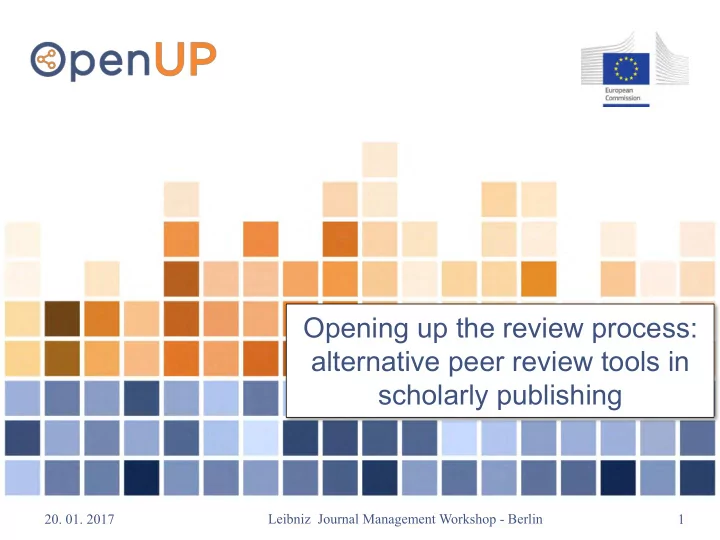

Opening up the review process: alternative peer review tools in scholarly publishing 20. 01. 2017 Leibniz Journal Management Workshop - Berlin 1
Our mission pening UP new methods, indicators and tools for dissemination peer impact Topics of research measurement review results Analysis User . Involving Defining of centered Methodolog stakehold require- available evaluatio -ers ments y methods n Arts and Social Life Humanitie Energy Use cases sciences sciences s within the Open Science ecosystem . Leibniz Association Leibniz 2 20. 01. 2017 Association
Target communities 3 20. 01. 2017
Peer review landscape scan • Analyze methods and tools, traditional but also innovative and emerging ones, • define roles and processes in non-traditional peer review, • develop a coherent, practical and validated framework for open peer review. 4 20. 01. 2017
What is Open Peer Review? 20. 01. 2017 5
Established review system Lengthy Quality control Costly Checking validitiy Bias Assessing originality and significance Lack of standards Abuse SWOT Tansparency Digital gap Motivation Bias Democratization Problems of open ID 20. 01. 2017 6
Open peer review: defining terms Controversial concept: open names/ID being used for several fairly different models of peer review. open process peer review community peer review Degree of openness: a peer review continuum on a scale from closed to open blind until optionally double blind single blind unattributed fully open purchased open Paglione 2015 20. 01. 2017 7
Defining open peer review: attributes Open Open Open report interactio identity n direct reciprocal review reports are authors and discussion between published alonside reviewers are aware of author(s) and the relevant article each other's identity reviewers, between reviewers. Open Openness Open participatio in time platform de-coupled from n review process publishing: facilitated does not follow the by a different wider community to standard temporal order of organizational entity contribute to the classical peer review than the venue of review process (submission, review, publication publication) Ross-Hellauer 2016 20. 01. 2017 8
Alternative review services Publishers Independent review Publishing services platforms Repository based Review review applications platforms and tools 9 20. 01. 2017
Alternative review methods and tools Open Post- Portable/ Machin Peer/public Decoupled peer publicatio cascading e-aided commentar peer review n peer peer review review y review review Transparency Fast dissemination of publications Standardization Openness in time Incentives/motivation for review 20. 01. 2017 10
OPR as game changer: Redefining scholarly communication 20. 01. 2017 11
Changing roles Role of peer review Functions: critical review/checking the soundness of research assessing originality, novelty, interest Changing role of editors Tasks: first scan, finding reviewers, reviewing, collaboration with authors/other editors Growing responsibility of authors Tasks: finding reviewers, cooperation with editors/reviewers, revisions based on community comments Involvement of peers Role of the community/peers: who is the peer? 20. 01. 2017 12
Growing demands 1. Transparency Novel Models for Open Peer Review. OpenAIRE report 2016 20. 01. 2017 13
Growing demands 2. Incentives to review • Monetary (2009 peer reviw survey results not in favour) • Social: crediting peer review ü Publons, Peerage of Science ü Peer review in academic promotion- recommendation of the OSI workgroup: Address incentives and motivations to participate in peer review, not only in the context of rewards or credits for individuals but also in terms of the importance of peer review for promotion and tenure. (Acreman 2016 ) 3. Mentoring peer review • Training is not provided in graduate or postgraduate education. • The process is often not formalized or communicated. 4. Standards 20. 01. 2017 14
Open science Good peer review depends on the trust and cooperation of all the players – reviewers and authors rely on each other to do a good job and both gain skills and experience from seeing the other side of the process. Leila Jones, Journals Development Manager, Taylor & Francis Open results Open process Collabo- ration Open Science 20. 01. 2017 15
Open science Wikipedia defines open science within the context of six aspects . (based on Kraker and penscienceASAP) Open Science is the practice of science in such a way The ultimate goal is to enhance openness in that others can collaborate and contribute, where disseminating and sharing research data, software research data, lab notes and other research processes are code, research results and papers, and in peer- freely available, under terms that enable reuse, review. redistribution and reproduction of the research and its (Masuzzo) underlying data and methods. 20. 01. 2017 16
Open collaborations C O M M U N I C A T I O N 17 20. 01. 2017
See more of OpenUP: http://openup-h2020.eu/ https://twitter.com/ProjectOpenUP https://www.facebook.com/projectopenup/?fref=ts Edit Görögh goeroegh@sub.uni- goettingen.de 2016-08-11 18 The OpenUP project received funding through the H2020 Framework programme, GA No: 710722
References • Acreman, B. et. al. 2016. Report from the Peer Review Workgroup. Open Scholarship Initiative Proceedings , Vol. 1. DOI: http://dx.doi.org/10.13021/G8K88P • FOSTER. 2016. Open Science Definition. Accessed on 16.01.2017: https://www.fosteropenscience.eu/foster-taxonomy/open-science-definition • Masuzzo P, Martens L. (2017) Do you speak open science? Resources and tips to learn the language. PeerJ Preprints 5:e2689v1https://doi.org/10.7287/peerj.preprints.2689v1 • Paglione, L and Lawrence R. 2015. Data exchange standards to support and acknowledge peer-review activity. Learned Publishing, 28: 309–316. doi:10.1087/20150411 • Peer Review Survey 2009. http://www.senseaboutscience.org/news.php/87/peer-review- survey-2009. (follow-up study of PRC 2008) • Novel Models for Open Peer Review. 2017. OpenAIRE2020 report. • Ross-Hellauer, Tony. 2016. Defining Open Peer Review: Part One – Competing Definitions. OpenAIREblog. Accessed on 16.11.2016: https://blogs.openaire.eu/?p=1371 • Ross-Hellauer, Tony. 2016. Defining Open Peer Review: Part Two – Seven Traits of OPR. OpenAIREblog. Accessed on 16.11.2016: https://blogs.openaire.eu/?p=1410 • Ross-Hellauer, T. 2016. Disambiguating post-publication peer review. OpenAIRE blog. Accessed on Sept. 14, 2016: https://blogs.openaire.eu/?p=1205 20. 01. 2017 Leibniz Journal Management Workshop - Berlin 19
Recommend
More recommend